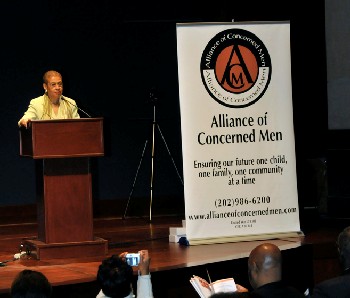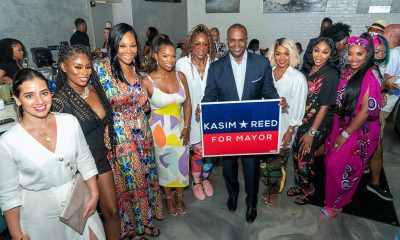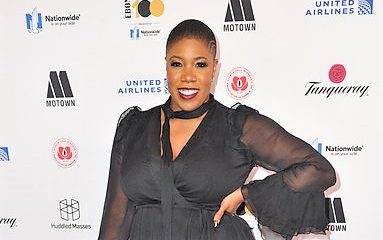Political Science
Combating Youth Violence
Grass Root Group, Youth Experts Share Secrets to Keeping the Peace
By Rochelle Boykin Bey
WASHINGTON – Images and reports of violence among America’s inner city youth were so common in recent years that some community members became apathetic about finding solutions to eradicate the problem.
With so many incidents of youth violence in cities like Philadelphia, Los Angeles, New York, Washington, D.C. and Chicago, which reported having three dozen students killed during the 2008-2009 school year, such tragic news would rarely make national headlines or even cause community members to break from normal routines.
The U.S. Justice Department says there were more than one million “criminally active” gang members in the country in 2008. And between 2004 and 2008, state, local and federal law enforcement reported a 13% increase in gang activity. A new survey released by youth advocacy organization World Vision found that 67% of U.S. adults cited the current economic crisis as the cause of the rise in gang violence among youth.
Gang violence is one of the many issues being addressed by the Congressional Black Caucus Foundation’s 40th Annual Legislative Conference, being held in Washington. One panel would address the pending Youth Promise Act, which will aid anti-youth crime groups.
For years, organizations like the non-profit Alliance of Concerned Men have been crafting new strategies to curb America’s inner city. Hoping to share its knowledge with law enforcement and community organizations in other cities, the Washington, DC organization recently released a training manual outlining several proven gang mediation and violence prevention methods.
To roll out the guide, the organization hosted a conference last year at the U.S. Capitol that featured a panel of judges, police, social work administrators and community leaders discussing some of the influencing factors that drive young men to join gangs. Among the factors include the high number of black fathers in U.S. prisons and a poor public education system.
“Without education, you are limited,” said Evelyn Queen, a former DC Superior Court Judge. “When children are not properly educated and appreciated, they build a frustration. That frustration ultimately turns into anger because they feel hopeless, and eventually that anger will explode.”
The ACM training manual details several practical measures police and other mediators can use to broker a truce between rival gangs. Barring cell phones from the meetings to remove the threat of an arranged ambush and offering hugs to settle the atmosphere are among the suggestions listed in the guide.
The ACM brings real-life experience to those practices, having helped bring about seven truces among gangs and rival groups in some of DC’s most dangerous neighborhoods.
The organization has drawn praise from U.S. Attorney General Eric H. Holder Jr., who in a statement published in the manual, championed the use of the group’s gang mediation methods.
“They have proven to be an effective tool in Washington, DC in reducing the level of crime in the areas where it operates,” the statement says. “I have great respect for the Alliance. I’ve seen the miracle they’ve brought. It needs to be duplicated. It can work in New York, Detroit, Los Angeles, and any other community in America with similar problems.”
Gang Prevention
The Alliance was formed in 1991 by six friends who attend Washington’s Eastern high school more than 30 years ago.
The ACM provides services focusing on gang prevention, intervention and mediation, job readiness, college preparation, substance abuse counseling and family strengthening.
“Concern with consistency is what we need in our communities to help the gang violence and help the youth as a whole,” says Tyrone Parker, executive director of the ACM.
The alliance’s leadership also has certain credibility among the young people it tries to reach. Parker, 62, spent time in prison for bank robbery as a youth. Parker’s son was also killed at 19 by another teenager following an argument.
Co-founder Arthur “Rico” Rush has also served time in prison, and regularly shares his story of being a homeless heroin addict at counseling sessions and other speaking engagements.
Groups like the ACM have been beneficial to young males like Brandon Forrest, who says he didn’t know his father as a child, and with a mother addicted to drugs, was forced to become a man at a young age.
Forrest says he was 11 years old when he started robbing grocery stores, which he used to pay the bills to support his three sisters. But the realities of crime would soon hit Forrest at age 15 when he was caught robbing and sentenced to 15 years in prison, which was later reduced to five years.
After his release, Forrest resumed a life of crime, but more polished. “Jail taught me to be a smarter, smoother, slicker criminal,” he says.
Forrest, now 22, eventually turned his life around with the help of counselors from the ACM. When he was released from prison he joined his neighborhood gang that was “beefing” with another close by neighborhood gang.
After numerous shootings between the two gangs the ACM stepped in and worked hard to bring the gangs together. This was definitely no easy task. The ACM helped initiate a truce between the two gangs by having them come together at the ACM’s office to talk about the rivalry. Forrest was involved in the discussions between the two gangs, and when he saw the dedication and persistence of the ACM he decided to leave the gang life and get involved in helping the ACM.
Forrest became a youth advocate for the Alliance. He could connect with the youth in ways that made him feel hopeful for the future. The work of the ACM gave him hope and showed him a lifestyle beyond the violence. He was able to motivate other young men to want more from their lives, through his story and his volunteering with the Alliance.
Influencing the Black Male
In addition to poor schools, the youth violence panel cited the disappearance of father figures and negative relationships with police as contributing factors in the well known statistics that have more black men in prison than in higher education.
Several free and practical approaches people can take to empower the youth were also discussed by the panel. The panel agreed that young black men need to be assured they’re valued and intelligent. Ways of achieving this could come in the form a positive mentor or a hug, panelists said.
Carlos Johnson, the Lead Assistant Principal at Elliot Hine Middle School in Washington, said young men are often looking for love because they have not had enough time “laptime” with their parents.
“They don’t have a father figure present and the mother is out working numerous jobs so there is no structure in the household,” Johnson says. “These young men find companionship with the wrong crowd…they start skipping school and getting involved in mischievous activities.”













